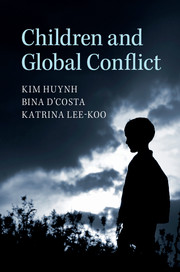Book contents
- Frontmatter
- Dedication
- Contents
- List of abbreviations
- Introduction: why children matter to global conflict
- 1 Children and armed conflict: mapping the terrain
- 2 Children and agency: caretakers, free-rangers and everyday life
- 3 Children and IR: creating spaces for children
- 4 The rights of the child: political history, practices and protection
- 5 Child soldiers: causes, solutions and cultures
- 6 Child forced migrants: bio-politics, autonomy and ambivalence
- 7 Children and peace building: propagating peace
- 8 Children and justice: past crimes, healing and the future
- 9 Who speaks for children? Advocacy, activism and resistance
- Conclusion
- Appendix
- Bibliography
- Index
6 - Child forced migrants: bio-politics, autonomy and ambivalence
Published online by Cambridge University Press: 05 May 2015
- Frontmatter
- Dedication
- Contents
- List of abbreviations
- Introduction: why children matter to global conflict
- 1 Children and armed conflict: mapping the terrain
- 2 Children and agency: caretakers, free-rangers and everyday life
- 3 Children and IR: creating spaces for children
- 4 The rights of the child: political history, practices and protection
- 5 Child soldiers: causes, solutions and cultures
- 6 Child forced migrants: bio-politics, autonomy and ambivalence
- 7 Children and peace building: propagating peace
- 8 Children and justice: past crimes, healing and the future
- 9 Who speaks for children? Advocacy, activism and resistance
- Conclusion
- Appendix
- Bibliography
- Index
Summary
Introduction
Children are on the move, covering great distances and facing daunting obstacles, increasingly without adults by their side. Fleeing conflict-ravaged and destitute regions of Latin America, children risk drowning, dehydration and imprisonment en route to the United States. From Africa and the Middle East, they are crossing the Mediterranean and hiding inside or under trucks and even on planes in the hope that Europe will fulfil promises of fraternity and civilisation that stretch back to the colonial age. In recent years, Afghan, Iranian, Iraqi and Sri Lankan children have risked their lives on overcrowded boats to reach far-flung destinations such as Australia and Canada. These movements are propelled by a mix of global, local and personal forces and raise fundamental questions of liberty and justice.
This chapter examines children's political exclusion and agency in the contemporary Age of Forced Migration. The first section outlines the global dynamics of forced migration and develops explanations from Agamben and Fassin as to why liberal democracies are fearful of and fearsome towards unauthorised arrivals, especially children. However, the profound objectification and mistreatment of forced migrants does not mean that they are totally superfluous to contemporary politics in the sense that they have no place in or impact upon it. Rather, they are highly politicised as warnings to people both outside and within borders of what happens to those who do not belong. Moreover, drawing from the work of Anne McNevin, it is argued that forced migrants, both adults and children, retain and fashion a degree of political autonomy even in contexts where their power is tightly constricted and the outcomes of their actions are ambiguous. The second section focuses on the demographics of child forced migration and sets out the push, enabling and pulling factors that have contributed to their prominence. The third and fourth sections apply the insights from the first two sections to an Australian context in which the bio-political contest over the suffering and resistance of irregular migrant children reflects a much larger struggle over what it means to be a liberal democracy in the twenty-first century.
- Type
- Chapter
- Information
- Children and Global Conflict , pp. 159 - 184Publisher: Cambridge University PressPrint publication year: 2015
- 2
- Cited by



